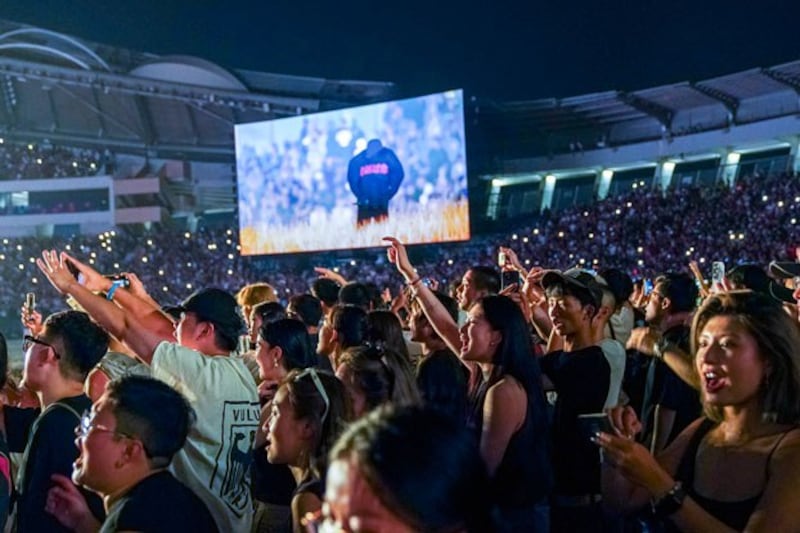The ruling Chinese Communist Party likely gave the green light to Sunday's Haikou concert by Ye, formerly known as Kanye West, in a bid to boost domestic consumption and economic confidence, despite ongoing bans and censorship of overseas performers, analysts told RFA Mandarin.
Ye, a Grammy Award-winning rapper, performed a sold-out set from his album "Vultures" in Haikou, provincial capital of Hainan island, at the start of the Mid-Autumn Festival holidays.
China in 2018 banned hip-hop and other "subcultures" from state television, with officials warning that the genre represents "non-mainstream culture" that is "decadent."
Since the lifting of COVID-19 restrictions in 2022, the government has continued its censorship of foreign artists and cancellation of their performances amid ongoing curbs on public expression.
Sunday's gig was Ye's first in China since 2008, and formed part of a bid by Hainan to "position itself as a hub for world-class music events," state media reported.
Wearing a T-shirt emblazoned with the slogan "I told you so" in Chinese, Ye brought along his entire family to perform alongside him at the sellout concert at the 42,000-capacity Wuyuan River Sports Stadium, the Global Times newspaper reported.
More than 96% of the US$96 tickets were bought by people living outside Hainan, with buyers mostly hailing from Shanghai, Guangzhou, Shenzhen, Hangzhou, Beijing and Chengdu, according to Hainan Daily newspaper.
Video of the show posted to Ye's X account showed him performing "Everybody" on a stage decked out like a field of tall grass alongside daughters North, Saint, Chicago and Psalm, while wife Bianca Censori and ex-wife Kim Kardashian came along too, Billboard reported.
"Eldest daughter North West and her furry hat led the charge as she held hands with her siblings through the fake amber high-grass field making up the stage," the report said. "Fans cheered on the family reunion while singing along to the Backstreet Boys-sampling chorus sung by Charlie Wilson."

'Electrifying' atmosphere, hard landing
At one point, Ye, who spent time as a child in Nanjing while his mother taught English at Nanjing University, told the crowd: "I love you, Haikou," the Global Times reported, quoting a fan as saying that the atmosphere at the three-hour show was "electrifying."
Chen Li-fu, president of the Taiwan Professors Association, said the decision by Beijing to allow the gig to go ahead was entirely political.
"China's economy is in a very bad state, in the middle of a hard landing," Chen said. "Faced with economic collapse, they urgently need to promote economic growth."
Chen said the decision could have been inspired by Taylor Swift's performances in Singapore at the invitation of Prime Minister Lee Hsien Loong earlier this year.
"Singapore's economy did well around that time, so maybe high-ranking Communist Party officials in Hainan saw this as an opportunity to make some money," he said.
Ye's Asia tour had originally been scheduled to kick off in Taoyuan, in democratic Taiwan on Aug. 25, and the 30,000 tickets for that show sold out quickly.
But the concert was canceled four days ahead of time, with organizers citing "unforeseen factors," after which Ye's team announced the Sept. 15 concert in Haikou. The changes gave rise to public speculation that the cancellation of the Taiwan show was a prerequisite for the Hainan date to go ahead. Ye's team hasn't confirmed or denied these claims.
Sun Kuo-hsiang, director of the Institute of Asia-Pacific Studies at Taiwan's Nanhua University, said Hainan was likely permitted to host the concert as it is far enough away from major Chinese cities to minimize any political fallout. And Ye and his team would have benefited from a one-month visa waiver program extended to U.S. nationals.
He said that Hainan will likely be further developed by Beijing as an "economic and cultural zone," as well as a stopping-off point for cruise ships, competing for roles previously played by Hong Kong, where artists are increasingly likely to run afoul of stringent national security laws.
Translated by Luisetta Mudie. Edited by Roseanne Gerin.
